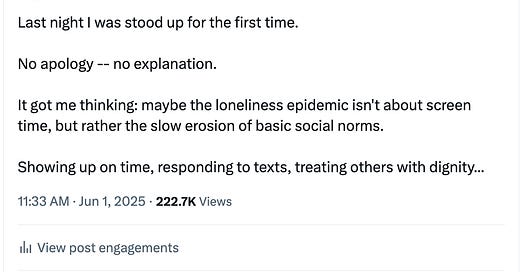This post is copied from a thread I wrote on X, which can be found here.
Last night I was stood up for the first time.
No apology -- no explanation.
It got me thinking: maybe the loneliness epidemic isn't about screen time, but rather the slow erosion of basic social norms. Showing up on time, responding to texts, treating others with dignity...
I must say, I was rather shocked by what happened. This guy had been messaging me for weeks. "Give me a chance!" he had asked when I shared my concern that he was too young for me. He asked for my Saturday night. I said yes.
There is a concept in Judaism called "Lifnei Iver" - it refers to a section of Leviticus that says, "You shall not revile the deaf or put a stumbling block before the blind."
The Torah's original literal meaning is straightforward:
Don't mislead or harm someone vulnerable.
Protect those who may not be able to see clearly or defend themselves.
However, Jewish tradition broadens the concept significantly.
The Talmud and other Jewish commentators have extended the concept to metaphorically include:
Misleading someone
Encouraging false expectations
Creating circumstances that set others up for moral or emotional harm.
It's forbidden to cause another person to stumble - morally, emotionally, or spiritually - even unintentionally. In Judaism, this principle ("lifnei iver") is considered so serious that, (according to Wikipedia) violating it can even become grounds for “excommunication” from Judaism.
In the Modern world, there are many ways that we mislead one another. For example, saying we will do something, and failing to deliver; making promises we don't keep; encouraging openness and trust or investment, and forgetting to follow through.
This doesn't just occur in friendships or romantic pursuits, but also in business. This morning, when I told my friend about what happened last night, he had the most interesting reaction -- he said, "You know why the Jews became such great merchants..?"
"Why?" I asked.
He replied, "For thousands of years, Jews faced severe discrimination. No one wanted to trade with them, so they often did business within their own community. But the community had strong internal values... If you violated trust, you'd be excommunicated and your reputation ruined. This trust allowed Jewish merchants to confidently finance costly ventures—like ships and expeditions—because they knew their partners would never leave them hanging."
Ultimately, trust is not built through grand gestures, but rather small, consistent acts.... Showing up on time. Keeping your word. Responding promptly. When trust erodes, communities fray, and loneliness creeps in.
Last night, my date set me up to stumble...
When he invited me to meet, he created excitement and hopefulness. By not following through, my evening became one of disruption and hurt. I felt humiliated and confused. Worst of all, I questioned my worth...
In Judaism, we have a responsibility to be sensitive to the emotional and spiritual well-being of others. It's not enough to say, "I didn't mean harm." The Jewish ethical standard is higher. It's "Did you actively prevent harm?"
The rise of casual ghosting, flaking, and "you do you" mentality is ultimately an epidemic of carelessness. It results in a culture where people repeatedly stumble and feel hurt. This leads to people becoming more guarded, less trusting, and ultimately, lonelier.
The fabric of society is built on trust. When we break trust, we harm more than just the person we've let down -- we erode our community and diminish ourselves as well. Perhaps the antidote to loneliness isn't more group activities, but simply being reliable and kind.











Share this post